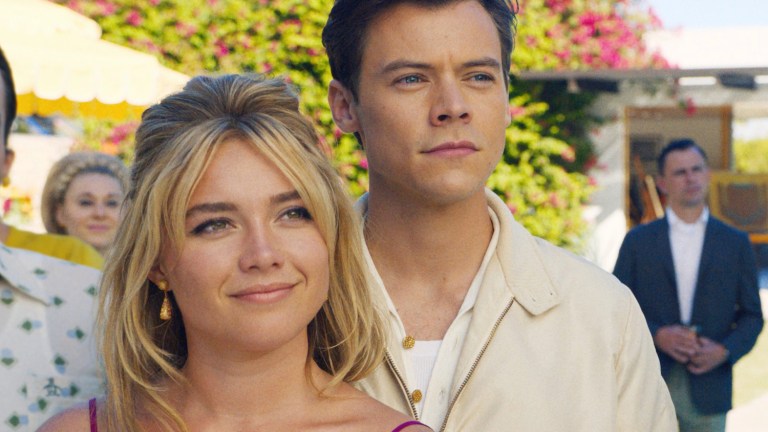Don’t Worry Darling Review: Florence Pugh Carries Troubled Olivia Wilde Film
Olivia Wilde’s second movie, Don’t Worry Darling, is a candy-coated mystery that bites off more than it can chew.

Immaculately coiffed women in flirty ‘50s frocks wave their handsome husbands goodbye as the men drive off to work in their color-coordinated cars. The women then retreat back to their stylish and spacious show homes with a skip and a song to clean and cook, or sometimes they meet the other gals to shop or lounge by the pool in the sun. It’s heaven. It’s utopia. It’s obviously not real.
Olivia Wilde’s sophomore effort as director, after her confident and joyful debut Booksmart, veers into mystery terrority. If you think you can guess where the story is going, well… you probably can but that doesn’t stop you from enjoying the ride.
Florence Pugh is gorgeous and captivating as Alice, young wife to Harry Styles’ Jack. The two are wildly in love and spend what time Jack isn’t at work making out and partying with the neighbors Bunny (played by Wilde) and Dean (Nick Kroll). The men work for the mysterious Victory HQ up in the mountains that surround this entirely secluded community. Trams run the women about town while their men work. Everything they could ever possibly need is provided for them. The only rule is they must never go to HQ, and none of the women know exactly what it is their husbands actually do.
Pastel perfection is intercut with nightmarish images, frenzied dancers, spots of blood, and a particular song as Alice starts to get the sense that something isn’t quite right. But it’s not until she witnesses a plane crash out by HQ and goes to investigate that things become truly messed up in her head.
Wilde is clearly stretching her legs with this ambitious feature which runs at just over two hours. That turns out to be a blessing and a curse. On the one hand the film looks great. Whether we are in the paradise of the town or the hellscape of Alice’s mind, imagery is distinctive and evocative. And while some of the plot beats are easy to predict, the slow build to the various reveals are tense and tantalizing. On the other hand, it’s all too much at times, and some of Wilde’s “darlings” really needed to be killed. Many standout scenes, including some that appear in the trailer, are purely atmospheric but there are only so many times you need to be shown a set-piece indicating “Alice feels trapped” before the point becomes labored. Pugh gives it her all though in a performance that demands physical and emotional heavy-lifting.
Unfortunately opposite her, Harry Styles gets a bit drowned out. While he was surprisingly good in Christopher Nolan’s Dunkirk as a supporting character, here he’s demanded to carry a leading role that has multiple layers that shift as the plot unfolds. It doesn’t quite work. He isn’t awful but he and Pugh are not on the same playing field, so there’s a certain emotional weight that’s lost. It’s perhaps telling that he only truly shines in a sequence at a party in a fancy club where he is brought up on stage to perform an increasingly frenzied dance. His physicality here, and Pugh’s reaction to it, speak volumes. Unfortunately, the rest of the time he’s just a bit flat.
Their lack of connection is never more apparent than when Pugh is performing opposite Chris Pine, however, who plays the creepy/charismatic head of Victory, Frank. He’s a charlatan, a cult leader, a rallyer of men; he’s a terrifying ball of damaging discourse wrapped in a palatable coating that the husbands of the town are desperate to digest. By his side is Gemma Chan’s Shelley, the archetype of feminine perfection. Chan is in serious danger of getting typecast but it’s undeniable she plays the part to a tee: softly spoken, stunning in an otherworldly way (after her turn in the show Humans we’re still a tiny bit suspicious that she might actually be a robot), and the most gracious and demure of partners, supporting her husband’s mission to the last.
The men all want to be Frank, or please Frank, or just get caught in the sunshine of his gaze. But Alice isn’t so sure.
A face off between the two at a dinner party is one of the best moments of the movie as the two fizz and flex, and Alice eventually flounders. This scene alone has as much to say about the patriarchy as any number of shots of Pugh wrapping her head in clingfilm, and Pine is wonderful.
That’s the slightly frustrating thing about Don’t Worry Darling: the movie has some very interesting things to say about modern masculinity and femininity, love, status, and the world as it is now. But unfortunately because of a rather bottom-heavy plot (there are a whole bunch of twists that come thick and fast in the final act) and because of the film’s conspicuous similarity to a handful of other things, those interesting points of discussion get a bit lost.
Updating a classic for 2022 sensibilities isn’t a crime however, and even if Don’t Worry Darling does feel a bit familiar, the worldbuilding is such that it’s still an interesting place to spend time. More a partially successful curio than a storming second film, we’re still stoked to see what leaps into the unknown Wilde will take next.
